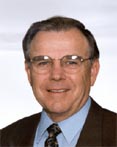2002 David W. Eckhoff
Drought Happens, Get Used to It! Will Technology Help Us Survive It?
 Dr. David W. Eckhoff, P.E. has forty years of experience in engineering. His focus has been on government projects, consulting engineering practice, teaching and research. His early experience involved both geotechnical and structural aspects of highway and pavement systems for Caltrans. Subsequently, he focused on environmental issues, working on research associated with water quality and wastewater reclamation. One of the highlights of Dr. Eckhoff's career was his selection as Project Director of the Salt Lake County 208 Water Quality Management Project by the Salt Lake County Council of Governments. This $1-million project resulted in the regionalization of wastewater treatment plants for the Salt Lake Valley, proposed ultimately to involve nearly $300-million worth of construction.
Dr. David W. Eckhoff, P.E. has forty years of experience in engineering. His focus has been on government projects, consulting engineering practice, teaching and research. His early experience involved both geotechnical and structural aspects of highway and pavement systems for Caltrans. Subsequently, he focused on environmental issues, working on research associated with water quality and wastewater reclamation. One of the highlights of Dr. Eckhoff's career was his selection as Project Director of the Salt Lake County 208 Water Quality Management Project by the Salt Lake County Council of Governments. This $1-million project resulted in the regionalization of wastewater treatment plants for the Salt Lake Valley, proposed ultimately to involve nearly $300-million worth of construction.
In 1971, Dr. Eckhoff joined the faculty of the Civil Engineering Department at the University of Utah where he served as the head of the Environmental Engineering Division until 1973 when he was appointed Chairman of the Department. His independent research and work with graduate students expanded to include a wide spectrum of engineering projects, such as the Utah Lake - Jordan River Water Quality Study and the Wasatch Canyons Land Use Impacts on Water Quality Studies.
Dr. Eckhoff was appointed by the Governor in 1980 to serve on the Utah Drinking Water Board, setting policies and standards for public water supply systems throughout the State. He served on this Board for fifteen years. He joined PSOMAS in 1997 as Vice President and Regional Manager and was responsible for developing the Utah Office. Dr. Eckhoff provided valuable engineering insight to the Envision Utah program that was assembled by Utah's Governor. Dr. Eckhoff served on the Quality Growth Efficiency Team (QGET) which made valuable recommendations to the development of growth for the State. He was recognized for his efforts on the QGET team and, in 1999, he received a Common Good Award from Governor Leavitt for this work. An outgrowth of this process was his development of the Municipal Infrastructure Planning and Cost Model (MIPCOM), which factilitates the inclusion of infrastructure costs in community planning efforts.
Recently, Dr. Eckhoff has been focusing on water conservation and water reclamation as important components of drought mitigation strategies. He serves on two AWWA national committees dedicated to water conservation planning, education, research and implementation, and to the revision of the Drought Preparation Handbook.
Dr. Eckhoff received his Bachelor of Science Degree with Honors from California State University at Sacramento in Civil Engineering, and his Master of Science and Doctor of Philsophy Degrees from the University of California at Berkeley in Hydraulic and Sanitary Engineering. He is affiliated with the American Society of Civil Engineers, is the Past President of the Utah Section of the American Water Resources Association. Dr. Eckhoff serves as a member of the Salt Lake Convention and Visitors Bureau Board of Trustees and Chairman of the University of Utah's Civil Engineering Department Advisory Board. In 1991, he was named Engineer of the Year by the Utah Engineers Council.
There is no argument - we are experiencing a severe drought in Utah, throughout much of the West and Midwest, and in other parts of the United States. Outside of the fact that we know it's a drought when we experience it, what is the scientific definition of drought? How bad is the current drought in both absolute and relative terms? What are the forecasts? Is there any relief in sight?
The presentation will discuss each of these questions, and will provide some answers in scientific, engineering, sociological and economic terms. Further, an instructive analysis of the hydrologic cycle, as it is expressed in Utah and the Intermountain West, will be presented. Coupled with this will be a discussion on how we use water - particularly in our urbanized Wasatch Front communities - and an evaluation of the question, "Are we wasting water, compromising future water availability, and thus setting the stage for worse drought consequences in the future?"
Drought remedies include a variety of practices and technologies, including anticipating and preparing for drought, water conservation, water reclamation and reuse, modified life-styles, and economic incentives/disincentives. Discussion will focus on some proven and promising technologies. To what extent can technology provide practical and durable solutions to the problems of drought? A lot depends on some key sociological and economic factors. Case studies will be highlighted to illustrate the issues.
Technology can significantly improve the quality of life. The real question is, "Are we ever satisfied with the technologically-improved quality, and to what extent are we willing to modify our life-styles as a component of a sustainable quality of life?" Without question, drought will happen again. Will we be prepared, or should we "Just Get Used to It?"
Contact
Special Collections
801-581-8863
Online Contact Form